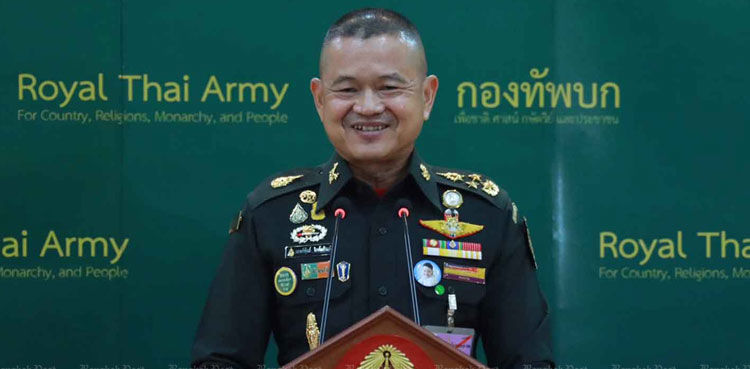
Thailand’s army chief has pledged not to stage a coup, as political parties geared up for final campaign rallies on Friday ahead of an election that could see the military-backed government voted out.
General Narongpan Jitkaewthae made the pledge despite the army seizing power a dozen times in Thailand in the past century, most recently in 2014.
Voters are predicted to deliver a heavy defeat to the government of former army chief and coup leader Prime Minister Prayut Chan-O-Cha, fuelling fears the military may actually seek to cling on to power.
But Narongpan told reporters on Thursday there would be no return to military rule, saying that the coups of the past were “very negative”.
“There shouldn’t be (a coup) any more. For me, this word should be deleted from the dictionary,” he said.
Sunday’s election is a clash between the opposition led by Pheu Thai, fronted by the 36-year-old daughter of ex-premier Thaksin Shinawatra, and the older conservative royalist-military establishment embodied by Prayut.
Pheu Thai is well ahead in the polls, but winning most seats in the lower house is no guarantee of taking power.
The prime minister will be chosen by the 500 elected MPs and 250-strong senate — whose members were appointed by Prayut’s junta, stacking the deck in favour of army-linked parties.
Pheu Thai is urging supporters to deliver a landslide victory to stop the military keeping them out of power, as happened in 2019 when Prayut rode senate support to became prime minister at the head of a complex multi-party coalition.
Thousands of supporters are expected to turn out at noisy and colourful final rallies for the main parties later on Friday.
It is the final big push in the first election since pro-democracy protests nearly three years ago rocked the kingdom with unprecedented calls for reforms to the powers of ultra-wealthy King Maha Vajiralongkorn.
Pheu Thai’s main opposition rival, the Move Forward Party, appears to have harnessed much of the energy of the youth-led protest movement, which voiced deep disaffection with the old political system.
Prayut, 69, has billed himself as the man with the experience needed to steer the country through turbulent times.
But he has overseen economic stagnation and a massive spike in the use of draconian royal defamation laws.
More than 200 people have been charged with insulting the monarchy in the wake of the 2020 protests.
Rights groups accuse Prayut’s military-backed government of abusing the laws to crack down on dissent.
‘Very pessimistic’
Thailand over the last two decades has been locked in a cycle of street protests, coups and court orders dissolving political parties.
An unclear or disputed election result could lead to a fresh round of demonstrations and instability, further hampering the tourism-dependent country’s already sluggish recovery from the Covid-19 pandemic.
The Shinawatra family’s bitter tussle with the royalist-military establishment has been at the centre of Thailand’s rolling political drama.
Thaksin was removed in a 2006 coup, and his sister Yingluck Shinawatra by Prayut’s putsch in 2014, and some analysts are sceptical that the military will release its grip on power now.
“I’m a realist. So, I’m very pessimistic about the electoral result being respected by the elite,” Napisa Waitoolkiat, a political analyst at Naresuen University, told AFP.
“If we had a coup d’etat, I’m not surprised… Thailand cannot get out of this culture of coups.”
from International News Today - Breaking News, US News, World News https://ift.tt/Wi5M4aS
via IFTTT